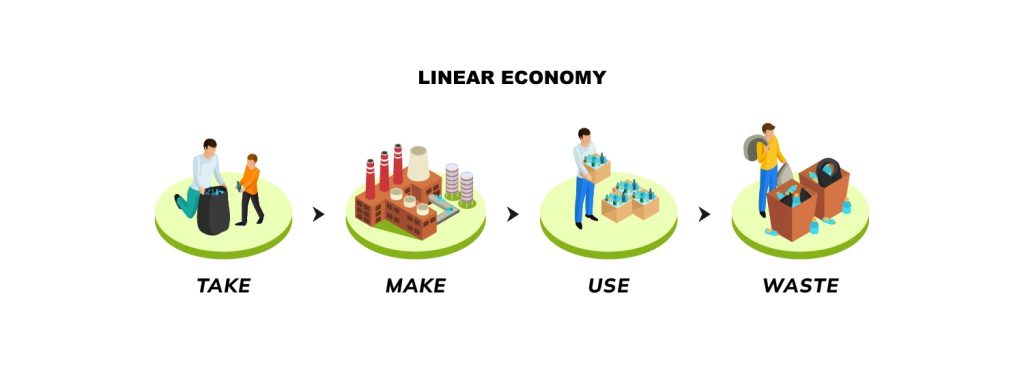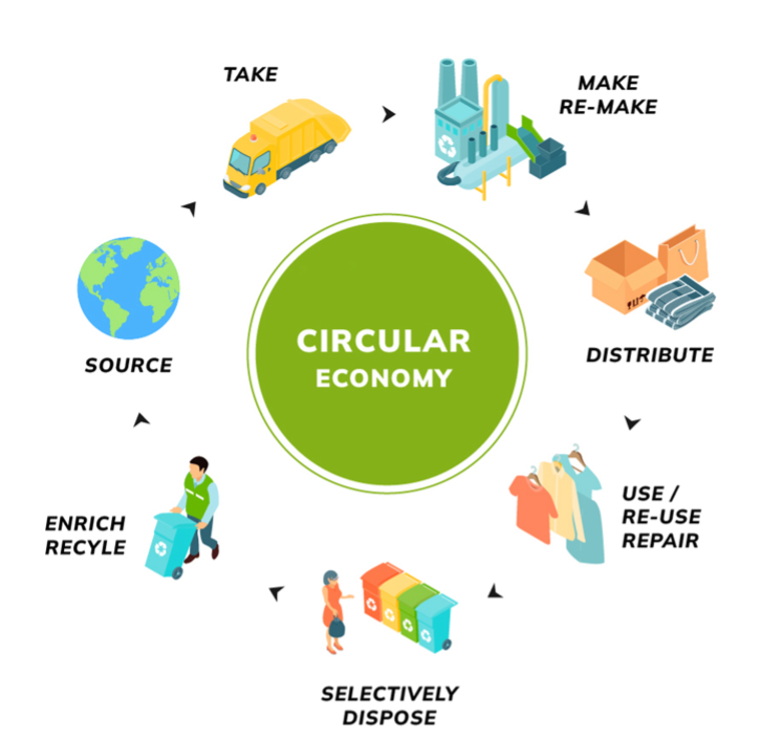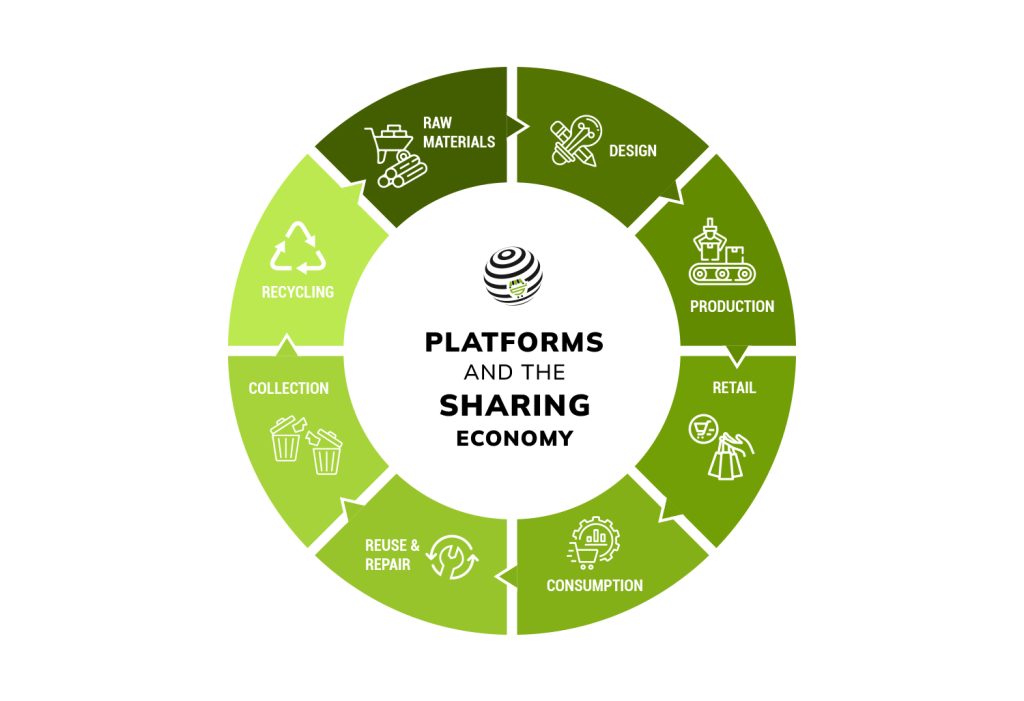HOW SHARING PLATFORMS ARE BRINGING ABOUT A CIRCULAR ECONOMY
A Paradigm Shift Towards Sustainability
CIRCULAR ECONOMY VS LINEAR ECONOMY:
The concept of a circular economy aims to revolutionize our current industrial model, which follows a linear approach of “take, make, and dispose“.

Instead, it advocates for restorative and regenerative innovations that extend the lifespan of products through thoughtful design and effective repair policies.
By reducing material consumption and waste and promoting reuse and recycling, the circular economy offers a sustainable alternative to our current practices.
LINEAR ECONOMY
The linear economy operates in a one-way direction, from raw material extraction to production, consumption and ultimately, waste.
This linear approach perpetuates the need for continuous resource exploitation, leading to scarcity and environmental degradation.
Valuable products that still have utility, often end up in landfills, polluting our land, waterways and atmosphere.
CIRCULAR ECONOMY

The circular economy addresses the pressing concerns of sustainability and climate change by striving to keep raw materials and products in circulation for as long as possible.
This shift has been exemplified by the rise of buy-less and share-more, peer-to-peer businesses. For instance, Airbnb properties in North America consume only 12% of the water used by traditional hotels and consume 37% less energy.
Similarly, Car2Go users have shown a 7-10% decrease in car purchases, opting for rentals instead. As a significant portion of a car’s emissions are generated during its production, this shift already contributes to a substantial reduction in carbon footprint.
Online platforms are known to excel at connecting disparate buyers and sellers. This model is poised to support the circular economy, which reuses raw materials, finished goods and idle assets.
PLATFORMS and the SHARING ECONOMY
Multisided platforms play a crucial role in supporting the circular economy by connecting buyers and sellers. Originally fuelling constituents of the circular economy, such as the Matchmaking Economy (eBay and SA-based WezWot), platforms have evolved to encompass the Sharing Economy (e.g., Airbnb and SA-based SwiftMart) and the Gig Economy (e.g., Upwork, Fiverr or SA-based SweepSouth).

By facilitating connections between consumers, enterprises, and each other, platforms enable the reuse, repair, refinement or recycling of raw materials and products.
The current global value of the circular economy stands at approximately $410 billion, with platforms accounting for around 25% of that figure. By 2030, the circular economy will be worth a staggering $1.5 trillion, with circular platforms making up nearly 60% of that value.
NEEDLESS MANUFACTURING vs CONSCIENTIOUS SHOPPING
One of the key issues we face today is the excessive amount of possessions we own.
Strikingly, as noted by AirBnb co-founder Brian Chesky, at one point there were an estimated 80 million power drills in America, each used for an average of only 13 minutes. Furthermore, up to 80% of the items stored in a typical household are used just once a month.
This unnecessary manufacturing could be significantly reduced if underused household items were freely shared among neighbours. Sharing platforms has the potential to enable these exchanges and expedite the transition to an efficient circular economy.
By changing our mindset towards ownership, sharing platforms can have a profound global impact. Peer-to-peer rental marketplaces encourage consumers to view their purchases as long-term investments, recognizing the products they own as valuable assets. This shift in perspective leads to more conscientious shopping habits.
For instance, a high-quality drill could easily pay for itself and more through future rentals. Not only does sharing platforms provide a significant passive income for those renting out their belongings; they also save money for borrowers. This change in consumer demand will undoubtedly affect tech manufacturers who produce disposable products.
If consumers perceive products as assets capable of generating a return on investment, they will be less inclined to purchase tech with a limited lifespan.
Sharing platforms taps into our idle assets, allowing them to generate income for owners and maximize the value of products. This financial benefit extends to both sides of a rental transaction, creating a win-win situation. Moreover, these platforms naturally encourage us to consume less frequently.
However, when we do make purchases, we are incentivized to invest in products with a longer lifespan. Sharing platforms has the potential to be a game-changing catalyst in our transition to a circular economy.
SWIFTMART
There exists a remarkable opportunity for platforms to serve as powerful catalysts for driving a circular economy.
ThredUp, a leading platform for second-hand apparel, Back Market, an online marketplace specializing in refurbished electronics, and Idle Fish, a prominent platform in China facilitating transactions for second-hand goods exemplify this potential.

And now SwiftMart from George, South Africa has partnered with Vibe Marketing to create an Airbnb-type online market place, but for unused garages, parking bays, tool & plant, sports and entertainment, as well as hospitality and domestic, etc. This platform enables owners of idle assets or goods to become business owners, thereby generating additional income.
Online sharing platforms and the circular economy has the ability to revolutionize the way we consume and dispose of goods, promoting sustainability and economic efficiency.
And during these tough economic times, every penny counts!
How can Vibe Marketing help you: Find out more here!

